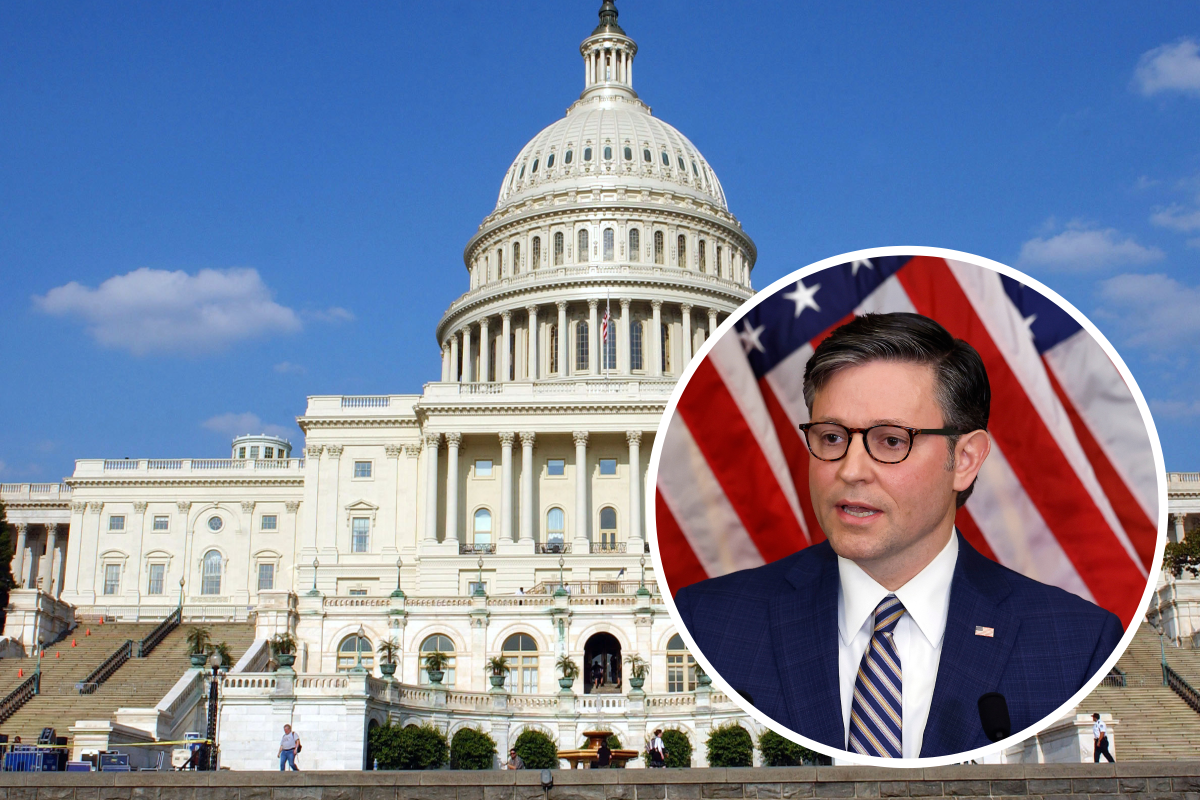Maura Zurick
Republican House Speaker Mike Johnson faced backlash from his conservative colleagues on Sunday after announcing that congressional leaders had reached a tentative agreement to fund the government in 2024.
Johnson, a Louisiana Republican, was appointed the 56th speaker of the House of Representatives in October 2023 after Kevin McCarthy was ousted from the position the same month for negotiating with Democrats to avoid a government shutdown.
Senate and House leaders announced a 2024 budget deal of nearly $1.66 trillion on Sunday. Despite the agreement, it's unclear whether Congress will be able to pass it into law in time to avert a partial government shutdown as the deadline looms less than two weeks away.
In a letter that Johnson sent to his Congressional colleagues on Sunday obtained by Newsweek, the speaker said that after weeks of debate, "we have secured hard-fought concessions" to allow the Appropriations Committee to finally begin negotiating and completing the annual appropriations bills. Johnson's letter said the agreement includes $886 billion for defense and $704 billion for nondefense.

The U.S. Capitol is shown in Washington, DC. The inset shows House Speaker Mike Johnson, a Louisiana Republican, is facing Conservative criticism after Senate and House leaders struck a deal on 2024 government funding on Sunday.
"The agreement today achieves key modifications to the June framework that will secure more than $16 billion in additional spending cuts to offset the discretionary spending levels," the speaker said in the letter.
Despite the cuts highlighted by Johnson, critics argue that the agreement's nearly $1.66 trillion price tag brings the spending in line with the deal struck last year between Democratic President Joe Biden and McCarthy that led to the former speaker's removal.
Johnson noted in his letter that the deal's "spending levels will not satisfy everyone" because the agreement didn't cut as much as some Republicans had been demanding. However, the speaker said the deal provides Congress a way to "move the process forward" and "reprioritize funding within the topline towards conservative objectives."
News of Johnson's deal on Sunday sparked immediate conservative outrage, with the House Freedom Caucus blasting the agreement as a "total failure."
While Johnson, in the letter to his Congressional colleagues, said the topline spending total was roughly $1.59 trillion, Democrats and critics noted that the true figure was higher. The House Freedom Caucus, which opposes the agreement, said the "true total programmatic spending level is $1.658 trillion — not $1.59 trillion."
"To call this 'unsustainable' is an understatement," The House Freedom Caucus said in the statement. "It is a fiscal calamity. Unfortunately, members of the House and Senate have done little to force a course correction from this calamity. Indeed, many have been party to it. Worse yet, we are extremely troubled that House Republican leadership is considering an agreement with Democrats to spend even higher than the modest $1.59 trillion statutory cap set six months ago by the Fiscal Responsibility Act and to obscure the actual spending numbers with more shady side deals and accounting tricks. This is totally unacceptable."
Representative Chip Roy, a Texas Republican, slammed the agreement's terms as "terrible" in a post on X.
"A $1659 topline in spending is terrible & gives away the leverage accomplished in the (already not great) caps deal," Roy said in the post. "We'll wait to see if we get meaningful policy riders... but 1) the NDAA was not a good preview, & 2) as usual, we keep spending more money we don't have."
Representative Matt Rosendale, a Montana Republican, also took to X to blast the deal, saying in a statement that the agreement "does nothing to increase border security, continues woke and wasteful spending by the Biden administration, and rubber stamps the policies of the Radical Left."
"Unfortunately there are only microscopic concessions made by the D.C. Cartel in this new spending 'deal' compared to the hundreds of billions it is costing Americans from illegals crossing our border and the imminent national security threat it presents #ShutDownTheBorder," Rosendale said on X.
Taylor Haulsee, a spokesperson for Johnson's office, told Newsweek in an email that the agreement reached on Sunday was $30 billion less than what the Senate was working on. Haulsee also said that the deal "represents the first cut to non-defense discretionary spending in years and is the best spending deal for the GOP in a decade."
Senator Majority Leader Chuck Schumer, a New York Democrat, and House Minority Leader Hakeem Jeffries, also a New York Democrat, issued a joint statement on the agreement saying that it includes funding for "key domestic priorities."
No comments:
Post a Comment